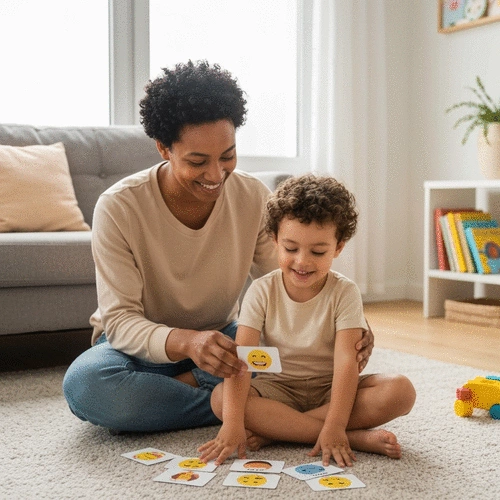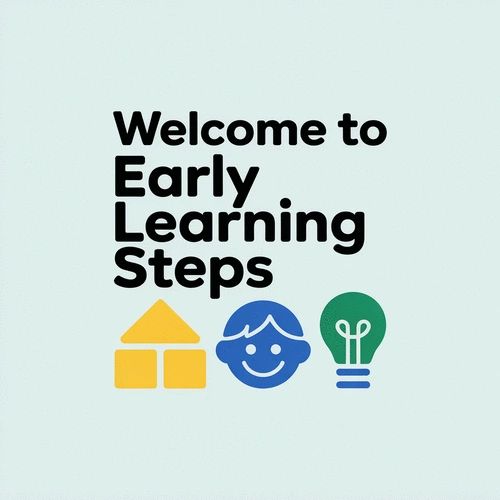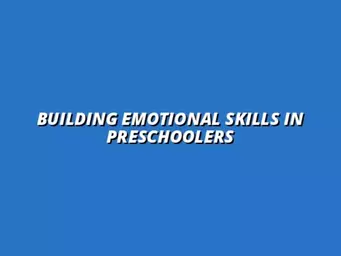What if the key to your child's future success lies in their emotional intelligence? Research suggests that children equipped with this vital skill tend to excel academically and socially. Discover how you can nurture this essential ability in your little ones.
What You Will Learn
- Emotional intelligence encompasses self-awareness, self-regulation, social skills, empathy, and motivation.
- Parents significantly influence their children's emotional development by modeling emotional responses and active listening.
- Creating a safe emotional environment encourages children to express a full range of emotions without fear of judgment.
- Attachment theory highlights the importance of secure bonds between children and caregivers in fostering emotional intelligence.
- Incorporating emotional vocabulary into daily conversations helps enhance children's emotional literacy.
- Engaging in role-playing scenarios can effectively encourage empathy and social understanding in children.
Key Components of Emotional Intelligence in Children
Emotional intelligence is built upon several foundational components that help children understand and manage their emotions and interactions. This visual illustrates these core elements.
Self-awareness
Recognizing one's own emotions and their impact on behavior.
Self-regulation
Managing emotions in healthy ways, such as calming techniques.
Social skills
Building relationships and navigating social networks effectively.
Empathy
Understanding and sharing the feelings of others.
Motivation
Harnessing emotions to pursue goals with energy and persistence.
Understanding Emotional Intelligence in Young Children
Emotional intelligence (EI) is a crucial part of childhood development that plays a significant role in shaping how children understand and manage their emotions. But what exactly is emotional intelligence? It refers to the ability to recognize, understand, and influence one's own emotions and the emotions of others. This skill is vital in fostering positive relationships, enhancing communication, and developing empathy. As parents and educators, nurturing EI helps children navigate the complexities of their feelings and interactions, laying the foundation for a confident and curious learner.
Why is emotional intelligence so important? Research has shown that children with high EI are better equipped to handle stress, resolve conflicts, and perform well academically. They are also more likely to build positive relationships, which is essential in both personal and school environments. At Early Learning Steps, we emphasize the importance of integrating emotional intelligence into everyday learning experiences, as it can significantly impact a child's overall development. Further research highlights the profound impact of emotional intelligence on various aspects of a child's life, from academic achievement to social competence, as detailed in this Frontiers in Psychology article.
Defining Emotional Intelligence and Its Importance
To grasp the concept of emotional intelligence, we must look at its fundamental components. These include:
- Self-awareness: Recognizing one's own emotions and how they affect behavior.
- Self-regulation: Managing emotions in healthy ways, such as through calming techniques.
- Social skills: Building relationships and navigating social networks effectively.
- Empathy: Understanding and sharing the feelings of others.
- Motivation: Harnessing emotions to pursue goals with energy and persistence.
Understanding these components allows us as caregivers to focus on specific areas where our young children may need support. Working on emotional intelligence not only aids in academic success but also fosters a well-rounded, emotionally healthy individual.
The Role of Parenting in Emotional Development
As parents, we play a pivotal role in the emotional development of our children. Our responses to their feelings can either promote emotional literacy or hinder it. For instance, when we validate our child's emotions—saying, "It's okay to feel sad"—we help them navigate their feelings effectively. Some key aspects of parenting that influence emotional development include:
- Active listening: Ensuring children feel heard and understood.
- Modeling emotional responses: Demonstrating healthy ways to express feelings.
- Creating a safe emotional environment: Allowing children to express a range of emotions without fear of judgment.
By incorporating these practices into our daily interactions, we set the stage for our children to develop a strong emotional foundation. A comprehensive review of the literature on parenting styles and their influence on children's emotional intelligence can be found in this Wiley Online Library publication, offering further insights into this crucial connection.
Exploring Attachment Theory and Its Connection to Emotional Intelligence
Attachment theory offers valuable insights into how emotional intelligence is developed in early childhood. This theory, introduced by psychologist John Bowlby, suggests that the bonds formed between a child and their primary caregiver play a vital role in emotional development. A secure attachment fosters trust, exploration, and emotional regulation. To cultivate a secure attachment, consider these practices:
- Consistent responsiveness: Responding to your child's needs promptly and appropriately.
- Physical affection: Offering hugs, kisses, and comforting touches to reinforce security.
- Quality time: Engaging in meaningful activities together to strengthen your bond.
Understanding and applying attachment theory in our parenting styles can profoundly influence our children's emotional intelligence, leading to lasting benefits throughout their lives. This perspective is further supported by a study on early childhood development and parental involvement, published in PMC NCBI, which underscores the long-term positive effects of secure attachments on emotional regulation and social skills.
Interactive Poll: Your Thoughts on Emotional Intelligence
As we explore the significance of emotional intelligence in young children, we want to hear from you! How do you prioritize emotional intelligence in your parenting or teaching methods? Share your approach with us:
Frequently Asked Questions About Emotional Intelligence in Children
What is emotional intelligence in children?
Emotional intelligence (EI) in children refers to their ability to recognize, understand, and manage their own emotions, as well as to recognize and influence the emotions of others. It includes self-awareness, self-regulation, social skills, empathy, and motivation.
Why is emotional intelligence important for my child?
High emotional intelligence helps children handle stress, resolve conflicts, perform better academically, and build positive relationships. It equips them with essential skills for navigating both personal and school environments effectively.
How can parents foster emotional intelligence in their children?
Parents can foster EI by actively listening to their children, modeling healthy emotional responses, and creating a safe environment where children can express their feelings without judgment. Consistent responsiveness and quality time also play a crucial role.
What is the role of attachment theory in emotional intelligence?
Attachment theory suggests that secure bonds between a child and their primary caregiver are vital for emotional development. A secure attachment promotes trust, exploration, and the ability to regulate emotions, laying a strong foundation for emotional intelligence.
What are some practical ways to teach children about emotions?
Practical ways include using emotional vocabulary in daily conversations, engaging in role-playing scenarios to encourage empathy, using emotion flashcards, and providing activity sheets that promote self-reflection.
Summary of Essential Parenting Tips for Emotional Intelligence
As we wrap up our exploration of emotional intelligence in young children, it's crucial to highlight the essential strategies that can help parents foster this vital skill. Remember, emotional intelligence is about more than just understanding feelings; it's about nurturing a child’s ability to express emotions, empathize with others, and develop resilience. Here’s a quick recap of key strategies:
- Enhance emotional vocabulary through regular conversations about feelings.
- Model healthy emotional regulation and self-awareness.
- Encourage empathy through role-playing and real-life social scenarios.
- Integrate Social-Emotional Learning (SEL) curricula both at school and home.
- Create supportive environments that prioritize emotional safety and positive reinforcement.
- Utilize reflection and problem-solving exercises to develop critical thinking skills.
These practices can equip your children with the tools they need to navigate their emotions effectively, setting them up for success in the future!
The Long-Term Benefits of Fostering EI in Children
Why does fostering emotional intelligence matter? The long-term benefits can significantly shape a child's life. Children who grow up with strong emotional intelligence are often more successful in their academic and social endeavors. They tend to have better relationships and lower levels of anxiety and depression.
Moreover, nurturing emotional intelligence equips children with skills that help them adapt to various life situations. They learn to cope with challenges, understand their emotions, and communicate effectively. As parents and educators, we play a pivotal role in laying this foundation!
Taking Action: Resources for Parents and Caregivers
Downloadable Activity Guides and Templates
To support your journey in enhancing your child's emotional intelligence, I've created some downloadable activity guides and templates specifically designed for you! These resources provide practical activities you can implement at home, making learning about emotions engaging and fun.
- Emotion flashcards to build vocabulary.
- Activity sheets that encourage self-reflection.
- Printable scenarios for role-playing exercises.
These resources can seamlessly fit into your daily routine, helping your little ones explore their feelings and develop their emotional skills.
Further Reading and Support for Emotional Intelligence Development
If you’re eager to dive deeper into the world of emotional intelligence, there are plenty of books and articles that provide additional insights. I recommend looking into resources such as:
- The Whole-Brain Child by Daniel J. Siegel and Tina Payne Bryson
- Emotional Intelligence 2.0 by Travis Bradberry and Jean Greaves
- The Emotionary: A Dictionary of Words That Don't Exist for Feelings That Do by L. A. M. M. V. Moore
These books offer valuable strategies and fresh perspectives that can enrich your understanding of emotional development.
Community Resources and Parenting Education Opportunities
Lastly, don't forget to explore local community resources and parenting education opportunities! Many organizations offer workshops, support groups, and classes focused on emotional intelligence and parenting. Connecting with other parents can be both enlightening and reassuring.
- Check for workshops at local libraries or community centers.
- Join parenting groups that focus on emotional intelligence.
- Look for online webinars or courses by experts in the field.
By engaging with these resources, you’ll not only enhance your skills but also build a network of support that can benefit both you and your child. Together, let's nurture a generation of emotionally intelligent children who are ready to face the world!
Recap of Key Points
Here is a quick recap of the important points discussed in the article:
- Emotional intelligence is essential for children's development, helping them manage emotions and build relationships.
- Key components of emotional intelligence include self-awareness, self-regulation, social skills, empathy, and motivation.
- Parents play a critical role in fostering emotional development through active listening and modeling emotional responses.
- Attachment theory highlights the importance of secure bonds between children and caregivers in developing emotional intelligence.
- Strategies to enhance emotional intelligence include discussing feelings, encouraging empathy, and creating safe emotional environments.
- Utilizing resources and community support can further assist in nurturing emotional intelligence in children.









